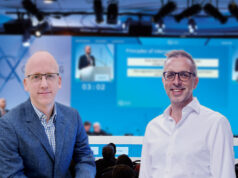
This year’s Global Endovascular Forum will begin on Saturday 8 April and will take the form of a series of rapid-fire presentations. The focus of the Forum is to provide a showcase for innovation with particular emphasis on new techniques, new technologies and new horizons in the management of vascular disease. This year’s Forum will concentrate on ten contemporary areas of interest: training in endovascular intervention; venous disease; renal; abdominal aortic aneurysms (AAAs); lower limb; thoraco-abdominal and aortic arch aneurysms; thoracic; thoracic aneurysms; thoracic dissection; and acute stroke.
The Forum will begin with a discussion about training in endovascular intervention and the needs of trainees from both the vascular and interventional radiology specialties. Mr Geoffrey Gilling-Smith, Liverpool, UK, will then discuss the merits of “The hybrid vascular specialist”. The Forum will subsequently examine the skills such a specialist would require, how they would be trained and their competency assessed. The session will highlight the next generation of vascular devices and the results of clinical trials that could have a dramatic impact in endovascular treatment. Featured technologies include: the paclitaxel vascular wrap; the novel use of diagnostic ultrasound; an update from the Insight study (about a biodegradable and absorbable metal stent); paclitaxel-coated balloons; and the three-year experience with a cutting balloon for haemodialysis access.
The seminar will then move on to a review of various treatments for venous diseases, starting with varicose veins. Dr Thomas Proebstle, Heidelberg, Germany, will compare different endovenous lasers, while Dr Lowell Kabnick, New Jersey, USA, will compare endovenous laser and radiofrequency ablation, and Mr Philip Coleridge Smith, London, UK, will present foam schlerotherapy results. In addition, Dr Graham Plant, Basingstoke, UK, and Professor Rolf Guenther, Achen, Germany, will present data on inferior vena cava filters (retrievable and permanent).
Dr Barry Katzen, Miami, USA, will begin the next topic by giving the audience his perspectives on the latest trials in renal intervention, followed by Dr Michael Lawrence-Brown, Perth, Australia, and Professor Yves Alimi, Marseille, France, discussing new approaches and technologies in laparoscopic surgery.
The next discussion on AAA will be separated into different categories including: emergency-EVAR; EVAR for small aneurysms; and surveillance after EVAR. Dr Mario Lachet, Zurich, Switzerland, Dr Frank Veith, New York, USA, Professor Jaap Buth, Eindhoven, The Netherlands, and Mr Bruce Braithwaite, Nottingham, UK, will discuss abdominal compartmental syndrome and report updates and clinical results regarding emergency-EVAR. In addition, Dr Ken Ouriel, Cleveland USA, and Professor Piergiorgio Cao, Perugia, Italy, will present updates from the PIVOTAL and CAESAR trials concerning EVAR for small aneurysms. This will be followed by a reception and workshop hosted by TeraRecon, entitled, “CTA and 3D planning for complex aortic endography”.Sunday morning will begin with presentations regarding surveillance after EVAR and will address such vital issues such as whether lifelong surveillance is really needed and whether ultrasound should replace CT, among others.
The subsequent lower limb discussions will focus on results from the European SFA Registry, duplex-guided stenting and overcoming stent fractures in the SFA. This will be followed by a review of new technologies for the lower limb including: a new kind of biograft in the absence of a vein; cryoperserved allografts; heparin-coated ePTFE grafts; and the Viabahn graft.
The next thought-provoking session will discuss hybrid approaches to thoraco-abdominal aneurysms and highlight combined repair of aortic arch and proximal descending aneurysms with the frozen elephant trunk technique. In addition, Dr Mike Dake, Virginia, USA, will present new technologies for thoracic stent grafts.
In the subsequent session, Dr Ron Fairman, Philadelphia, USA, will present mid-term results of the high-risk arm from Medtronic’s VALOR trial, while Dr John Reidy, London, UK, and Professor Jean-Pierre Becquemin, Paris, France, will discuss emergency thoracic stent-grafting and question whether endovascular techniques will replace open surgery.
The penultimate field up for discussion is thoracic dissection, and the audience can look forward to presentations by Dr Patrice Bergeron, Marseille, France, Professor Krassi Ivancev, Malmo, Sweden, and Professor Christoph Nienaber, Rostock, Germany, who will present three-month data from the INSTEAD trial.
The final session concerns acute stroke and attendees will hear presentations from Drs Juan Parodi, St Louis, and Nelson L Hopkins, Buffalo, USA, among others, on carotid artery stenting and mechanical techniques to remove clots.













